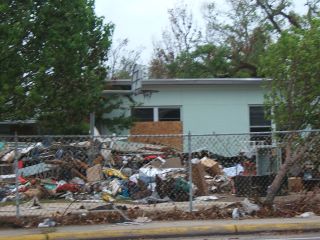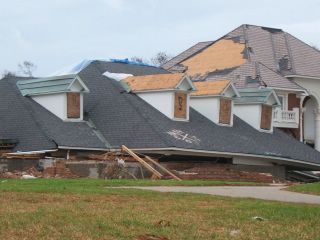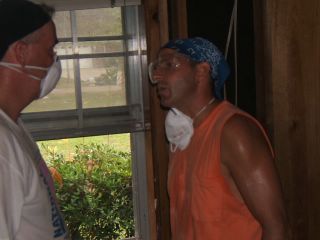I left the coast Thursday evening and drove as far as
Birmingham before sleepiness caught up with me. Even there, in the lobby of the hotel where I spent the night, I found reminders of what and who I was leaving behind: FEMA forms for reimbursement for those seeking shelter from the storm.
On Friday morning I detoured into downtown to walk through Kelly Ingram Park past the 16th Street Baptist Church. There, while sitting on a statue commemorating the children of the Birmingham campaign of 1963, I was reminded of others seeking shelter. A homeless man approached me and asked for a couple of dollars for food. I asked him if there was somewhere nearby to eat and he pointed across the park. I said, “are you hungry?” and, when he nodded “yes,” I said, “come on, I’ll buy you some breakfast.”
We walked through the park and shared bits of our stories. His name is Theodore. He is 30, African-American, born in Huntsville. I am almost 45, white, born in Tuscaloosa. Two sons of the Southland whose journeys crossed momentarily in this park in which the right to journey together was secured.
We talked a bit about what had happened in the park when I was a child. I shared with him how my own sense of ministry, and my own feeling of being called into ministry were shaped by the memories of what people of faith had done in places like Kelly Ingram Park to transform the world we grew up in.
He told me he wanted to find a job as a painter. I asked him if he had any construction experience and, when he said “no,” I suggested asking the folks at the 16th Street church to connect him to someone who could teach him to hang drywall. If you can hang drywall you can make a living on the Gulf Coast for years to come. There will be jobs for drywall workers far after the last volunteer pastors have left the coast.
In the grand scheme of things, hanging drywall – or ripping it down when it’s been flooded out – are probably more necessary jobs than pastoral ministry. In any case, such work certainly offers the great satisfaction of immediate results.
I left the Gulf Coast in time to make it back to Washington for the major demonstration calling for an end to the Gulf War. Alas, that work offers no immediate results. It is, however, inextricably bound to the work on the Gulf Coast and to the fate of folks like Theodore in Birmingham and in cities across the nation.
As Martin Luther King said in calling for an end to the war in Vietnam, “a nation that year after year continues to spend more money on national defense than it does on programs of social uplift is approaching spiritual death.”
Signs and symptoms of spiritual death are all around us in the American empire. We continue to be, as Dr. King noted 40 years ago, the greatest purveyor of violence in the world. Our coarsened culture has become also the greatest purveyor of cheapened sexuality, mass consumerism and hyperindividualism.
Despite what some preachers will contend, and despite what some passages of scripture seem to suggest, I cannot believe that God sends down huge storms to destroy wayward societies. But the still, small voice of God does speak through the whirlwind, calling us in the wake of Katrina to refocus our priorities, to rebuild the commonwealth, to restore justice to the public square and repair the breaches of the cities’ streets to live in. In such work, a profound joy meets our time’s deepest need.






